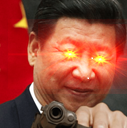Your comment doesn’t make any sense.
The fundamental forces are physical forces.
It is feasible for consciousness to be something like a force (more accurately, perhaps, a field) and as such it would be by definition a “physical” force. The use of the modifier “physical” on force doesn’t make much sense here: all forces are physical, as are all things that actually exist. It could be useful to consider the objects of consciousness as emergent, and the force of consciousness as fundamental; I don’t know enough about this line of thought to say much on that.
Consciousness is not a force, as far as we know.
That’s literally what the comment you’re replying to says. Emphasis on “as far as we know”. There’s no obvious way to dismiss it outright as not being a force, it’s just that as far as we know currently, it isn’t a force.
I don’t personally have a well thought out stance on the matter.


























So in theory they could exist anywhere in the universe somewhat close to a star, if the relevant particles in our atmosphere are around that star? That’s what I meant about the density distribution: are they spherically distributed around (all) stars, or are they only present in very specific situations?
I thought they had a small selection of possible decay products. Not particularly relevant to me at the moment, though.
I mistyped the mean lifetime, it’s actually 2.2 microseconds. That’s three orders of magnitude different, but from a (non-relativistic) view it would still only travel about 66 centimeters. I’m missing too much information to try to solve the length contraction equation (I don’t know its length, or its velocity) for the observed length. I’m curious here because they’re able to travel on the order of roughly 50 meters into the Earth, and from what I can find they disappear there due to absorption from the many atoms they pass through on that path. So that leads me to a question: If there is not relatively dense earth to get in the way and attenuate the muon, such as if it were produced by a gas cloud beside a star, how far would it realistically be able to travel? Since the muons on Earth “die” from absorption rather than lasting long enough to decay via weak force, they would, in open space, surely be able to travel far enough without enough collisions such that they do end up “dying” by decay.
Thanks for the reply, I am curious here about something that I don’t have enough knowledge to answer for myself.